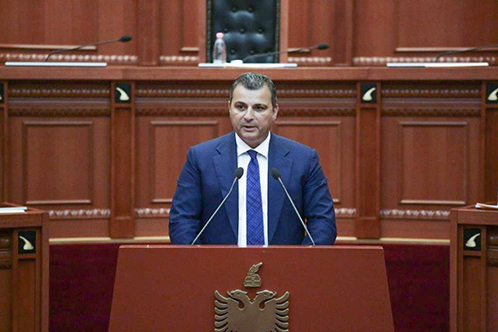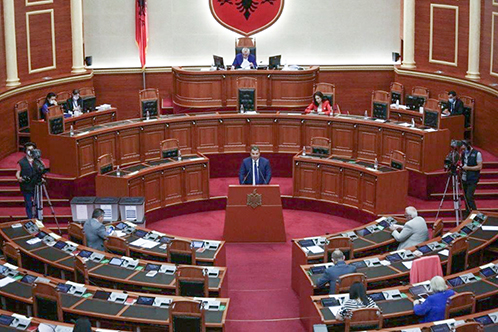BANK OF ALBANIA
PRESS RELEASE
Governor Sejko: Address to the Assembly of the Republic of Albania presenting the Annual Report of the Bank of Albania for 2019
Publication date: 02.07.2020
Honourable Speaker,
Honourable Members of Parliament,
Thank you for the invitation and the opportunity to present to the Assembly, the Annual Report of the Bank of Albania for 2019.
Overall, I affirm that the work of the Bank of Albania has provided a positive contribution in strengthening the financial and monetary stability of Albania. This stability is a crucial precondition for the sustainable and long-term growth of the country. Also, the Bank of Albania has fulfilled its legal duties; has progressed with the implementation of the Medium-term Development Strategy; and has implemented the recommendations provided by the Assembly of Albania.
***
Pursuant to the applicable legal framework, the main objective of the Bank of Albania is achieving and maintaining price stability.

- Albanian economy and monetary policy in 2019
Year 2019 was a challenging one to the Albanian economy. It continued to benefit from the increase of private consumption, and the rapid expansion in tourism sector. Nevertheless, the external economic environment was unfavourable, while the fall in production of electrical energy, the gradual finalisation of investments in large energy projects, and the earthquake of November 2019, provided strong negative effects. Hence, economic growth in 2019, stood at 2.2%, downward from 4.1% in the previous year.
The shocks we suffered drove to the slowdown of the economic growth pace, but did not deviated the Albanian economy from the positive development trend. This performance was reflected in the reduction of unemployment rate, the increase of employment and wages, and the decrease of both external and public debt of Albania. In parallel, the main indicators of the banking sector’s soundness remain at adequate levels.
In 2019, inflation averaged 1.4%, downwards from the previous year. The still undershooting inflation rates dictated the maintaining of the accommodative monetary policy stance throughout 2019. The Bank of Albania kept the policy rate unchanged at 1.0%, oriented the market towards maintaining the accommodative monetary policy stance in the medium-term horizon, and supplied banks with the necessary liquidity.
In response to our monetary policy, the financing conditions simulated the growth of aggregate demand and were adequate for the convergence of inflation to the target. The monetary stimulus drove to the decrease of credit price and bolstered the increase of lending. In these circumstances, lending to private sector experienced a relatively rapid growth and showed a better allocation. Also, the monetary stimulus reduced the debt servicing costs to enterprises and households, and provided the premises for a more stable foreign exchange rate in 2019.
In addition to supporting the price stability, the Bank of Albania has paid attention also to the maintaining of financial stability, through the prudential supervision and regulation of the banking system and by coordinating the work with other authorities of financial sector supervision.

- Banking supervision and financial stability
The Albanian banking sector continues to remain financially sound and has shown an upward dynamism. This sector has been profitable throughout 2019, while its indicators of liquidity and capitalisation stand above our regulatory requirements. Also, our stress test results show that banking sector's exposure to systemic risks is contained, and its ability to withstand risks is robust.
Following, there are briefly summarised some of the main directions of our work for strengthening banking supervision and supporting the financial stability.
- First, the Bank of Albania successfully managed the consolidation process of the banking sector. This process re-configured the domestic banking market, bringing about new and motivated actors as well as the increase of the domestic capital.
- Second, the Bank of Albania fulfilled all its obligations in the framework of the national plan for the reduction of non-performing loans. The non-performing loans ratio dropped from a maximum of almost 25% in 2014, to 8.4% at the end of 2019, attributable to the measures undertaken in years.
- Third, the Bank of Albania worked to fulfil the recommendations provided by the Committee of Experts of the Council of Europe on the Evaluation of Anti-Money Laundering Measures and the Financing of Terrorism – MONEYVAL. In the MONEYVAL report, the effectiveness level of financial institutions was rated as “substantial/considerable.
- Last, the work for boosting sound lending to the economy is continuously accompanied with a prudential on-site monitoring of the financial system.
The realisation of institutional duties implies also a constant attention on other fields of the Bank of Albania's activity. I find it necessary to highlight the further development of resolution function; the promotion of the payment system development; the strengthening of banknotes’ quality; foreign reserve management; the improvement of statistics; the support to the European integration process; the work for the education of public and improvement of communication with it.
***
Honourable Members of Parliament,
This moment that I am addressing to the Assembly is unprecedented. Covid-19 pandemic outbreak and the necessary measures taken to contain it, have hit hard the Albanian households and firms during the last three months. The Albanian economy is expected to fall during 2020, being accompanied by: an increase of unemployment; drop of households’ income; worsening of the financial situation of firms; and increase of non-performing loans in the banking sector.
Public authorities stepped up a rapid and comprehensive response to this shock, concerning both the health care and the socio-economic consequences.
In addition to easing fiscal measures, the Bank of Albania, undertook a complete package of measures to provide the needed liquidity to the banking system, boost lending and control debt servicing costs. This package consists in:
- reducing the policy rate, at 0.5%, and the unlimited supply with liquidity to the baking system, aiming to boost the smooth functioning of financial markets and reduce credit cost to private sector;
- the temporary easing of bank regulations, to provide the temporary extension, with two quarters, of the payments of credit, for clients facing difficulties, and the consensual restructuring of loans to clients with solid business perspectives, aiming at improving business’ finances and increasing their chances to survive;
- eliminating the operational costs of electronic payment system, in response to the upward demand for this type of activity; and
- enhancing the operational capacities to guarantee the supply of economy with cash, by providing a sufficient stock to meet the increasing demand of market for cash.
In response to these measures, the financial markets continue to function smoothly, notwithstanding the increased demand of the public sector for financing and the heightened uncertainty in the economy. In addition, these measures enable and complete the fiscal package of the Albanian government.
In economic terms, the coordinated fiscal, monetary and macro prudential measures have partially mitigated the negative effects of pandemic. However, the challenges lying ahead are serious. We deem that the Albanian economy has the prerequisites to successfully face this shock. Hence, it requires all public actors and private sector operators take discretionary, timely and coordinated decisions.
Dealing with this shock is within our possibilities, if everyone will do the best and if we will continue to guarantee with priority the monetary and financial stability of Albania.
Thank You!

 Twitter
Twitter
 Youtube
Youtube
 Facebook
Facebook
 Flickr
Flickr
 RSS
RSS
 Subscribe
Subscribe
 Feedback
Feedback